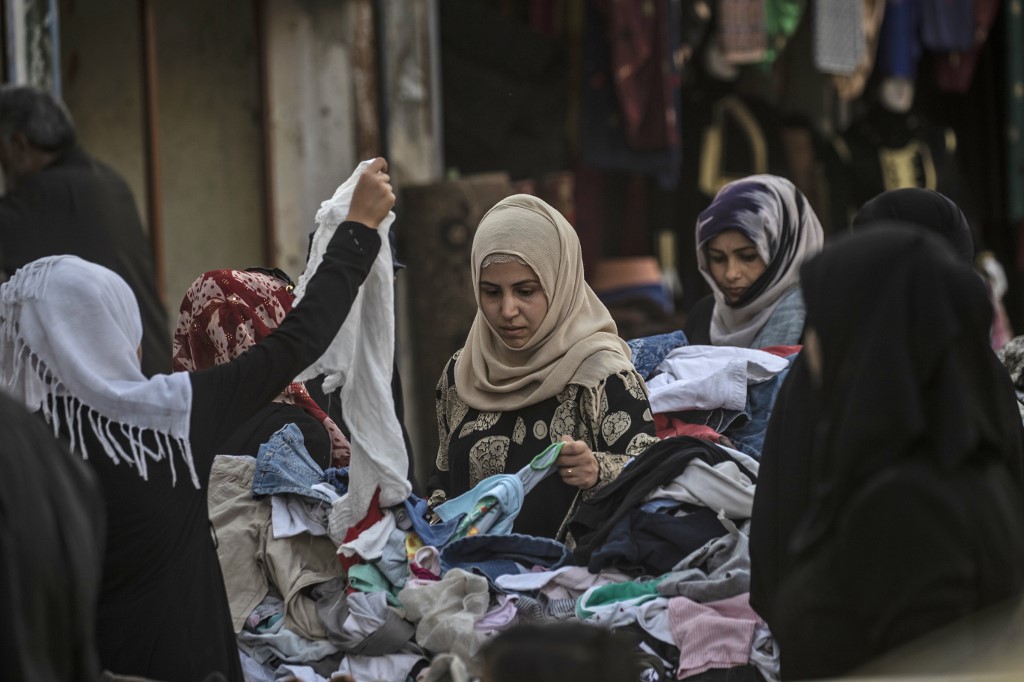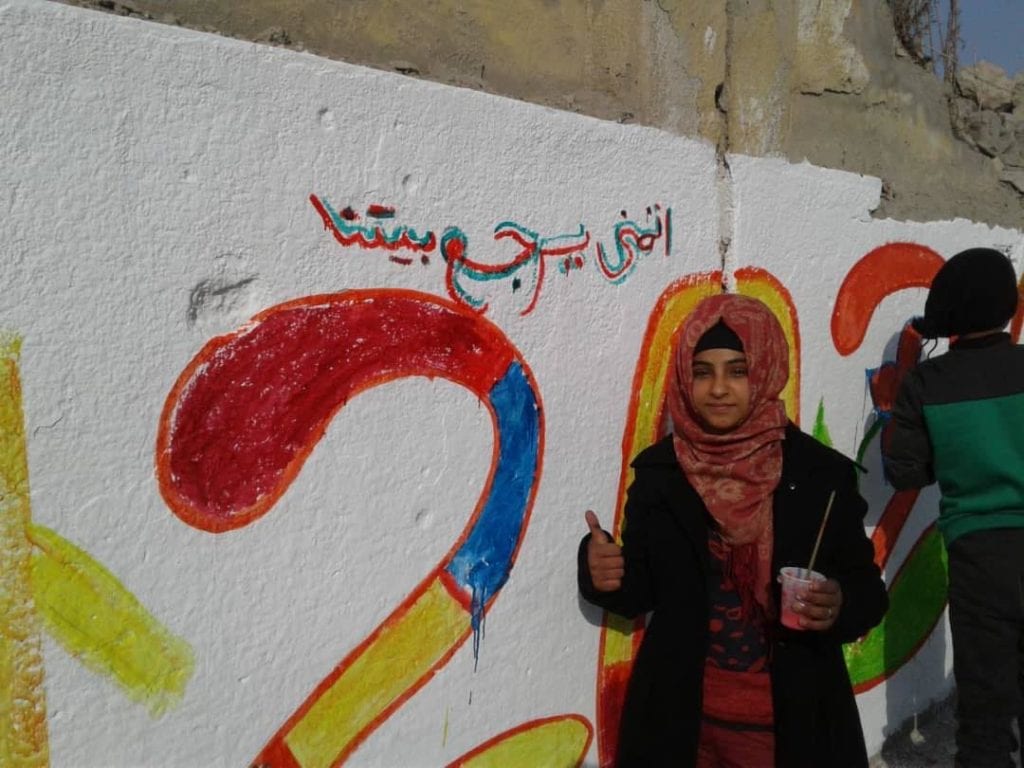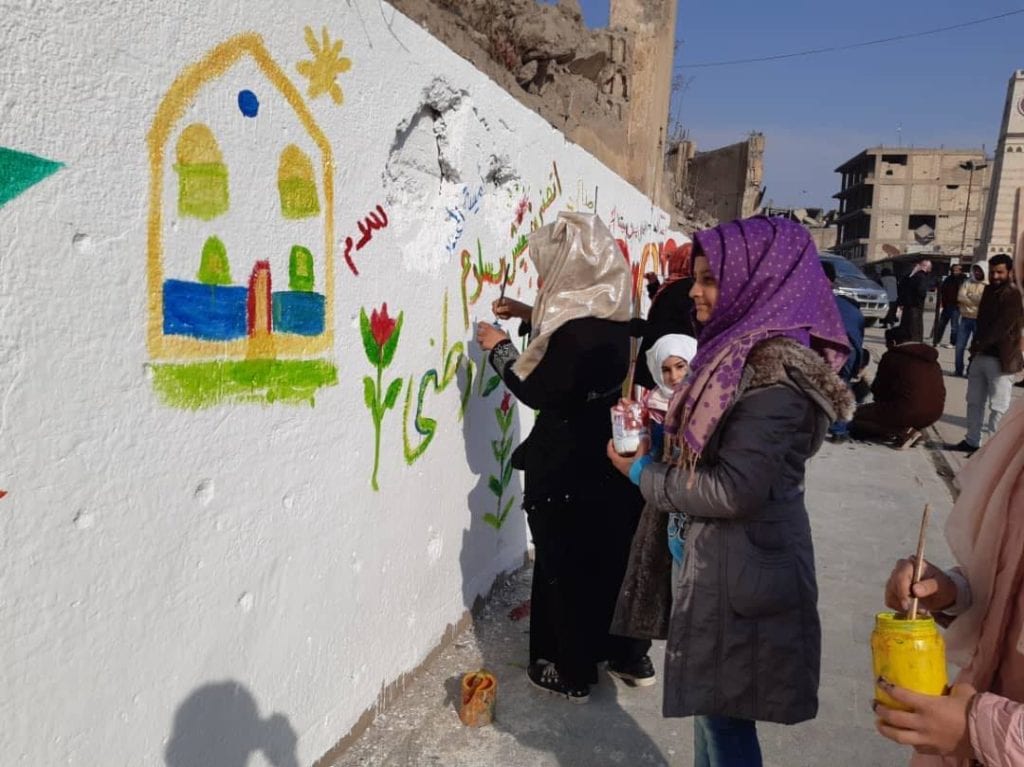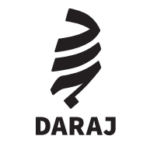“I became a man and a woman at the same time”. This is how Hanaa al-Eissa, a 43 year-old Syrian woman, describes herself today, after suddenly becoming responsible for providing for her 3 children. She lost her husband 4 years ago, in Deir Ez-Zor, due to the ongoing war over there. Before the tragic events struck her and her family, she did not even know the meaning of employment. She did not have any experience in any field of work, but after her reality check, she joined a training course at “Ayady Center for Vocational Training”. There she trained to be a cashier, so she could finally find a job opportunity at the city of Tabaqa, in Raqqa.
Through her thick eye-glasses, at a second-hand supermarket, Hanaa stares at the cash register in front of her, her fingers increasing in grace and expertise. She grabs the packets of rice and cartons of milk from the hands of the customer, places them in plastic bags, calculates the price and receives the money from him. Her eyesight has not deteriorated solely due to her work with precise numbers and calculations at the store, but rather due to what comes after the cash register: the sewing machine at home. This is how she spends her life, no downtime. Her daily journey begins at 8 am, when she sets off for work, to return home in the evening and on holidays to her sewing machine at home, in order to earn some extra income for her family, by means of mending and vamping tattered old clothes, currently an urgent need for most Syrians who are unable to afford new clothes due to their outrageously high prices.

Losing the Breadwinner Turned the Tables
The outrageous inflation and the large number of Syrian families losing their breadwinners, has turned the tables and thrown the responsibility in the direction of the women, with so many of them finding themselves in a situation similar to Hanaa’s. At 25, Um-Shaimaa became a widow with two children, after her husband was killed in an air raid by the Syrian regime on Muhassan, in Deir Ez-Zor. She joined a training course at the “Together for Deir Ez-Zor” association, which specializes in vocational training. She was forced into working in the fields, planting and ploughing, as this was the only work she could do, without holding neither a college degree, nor a high-school certificate.
Sun spots have brightened her rural features. This face had not known the sun at all in the shadows of the rule of “ISIS”, for like many women like her she was required to cover her face in a black burqa. Today, she works with her friends in open air… Um-Shaimaa jokingly comments about how she does not need face powders or cheek blush, as her beauty is all-natural!
Currently, there’s no roof over her house, to protect her family from the cold, and the chaos of the climate. When she moved to Deir Ez-Zor, she was faced with the problem of securing a home. She found herself constantly on the move, because of the high rental prices, and the whim of different landlords. When her father and brother were arrested by the regime’s forces, she found herself responsible for her mother, too.
Around the wooden fireplace, Um-Shaimaa places her baby in her lap and sings her lullabies. She boils aged tea and heats crunchy pastries on the same fireplace, and has breakfast with her small family. Her day starts early, and before going out to the field, she gets some chores done, making sure the family has the needed provisions, then continues to run in this endless loop of exhaustion, inside the house and outside of it.


Educating the Kids At All Costs
Amina Mahidi―37 years old―is facing a somewhat different scenario, as her husband was left quadriplegic after the war, which made her responsible for him and for their three children. The way she constantly moves her head exposes to you a chronic pain in her shoulders and neck, as she is forced to contort them all day in the direction of her sewing machine, after she found a job opportunity in embroidery. Her salary barely helps her secure rent and hardly satisfies her family‘s needs, but she insists on continuing to work, saying “my goal is to educate my children, whatever the cost may be.”
Amina joined “the Wefaq Association for Vocational Training”, after meeting some of those who work there during a campaign that was active in the governorates of Raqqah and Deir ez-Zor in northeastern Syria, under the slogan of “We are her family”. The campaign also supports similar vocational and professional training associations such as: “Together for Deir ez-Zor” and “Ayady Center for Professional Training.”


Before the Revolution..
“Within the social structure of Syria, there were no female breadwinner families, except in very few cases and under specific circumstances,” Rakan Assad, social scientist tells Daraj.
“Men (fathers/brothers/husbands) used to be the main breadwinners for their families, but now, due to the deteriorating economic situation and the harsh conditions that the war created, in addition to the disappearance of many and the injury of others, women became the main breadwinners for a huge number of families,” He adds. “Many of them had no choice but to work in different fields, sometimes outside of their specialities or expertise, as the options don’t always match their wishes, especially in the dire conditions where you’re left to face the absence of the family’s breadwinner, due to death, immigration, forced disappearance or compulsory military service, among other reasons.”
“The fields in which Syrian women work, today, are classified among education, humanitarian and medical fields, in addition to agriculture. Women’s widespread interest in vocational training programs was also revealed, so the organizations providing training were active in the fields of media, sewing, nursing and others,” Assaf noted.


Nurses for the First Time
Um-Qasem, 23 years old, spends most of her time, after her husband lost his job, outside her small house. She was forced to go down to the city, and she joined one of the hospitals in the village of Hamar al-Kasra, located in the Deir ez-Zor province countryside. She began working as a nurse, after she was trained in the “Together for Deir ez-Zor” association. She was encouraged by her neighbors and family to do so, as she helps them and treats minor medical conditions that don’t require a Doctor’s checkup. She also provides first aid services for emergencies, especially since most hospitals and pharmacies are far, as she elaborated with a smile.
“My profession is primarily humanitarian and that’s why I loved it and grew attached to it, and after practicing it I acknowledged for the first time my importance and worth to society as an active member, not just as a mere housewife managing her family’s affairs”
Um-Qasem is content with the changes that occured today after ISIS fighters withdrew from the area. Under ISIS’s rule, she had never dared to allow herself to think about having a job, due to the strict restrictions and punishments imposed by the organization. The family had been living on the remaining savings and some aid. Today, Um-Qasem is dreaming of opening her own private clinic and says that she’ll keep on working even when her husband finds a job. “My profession is primarily humanitarian and that’s why I loved it and grew attached to it, and after practicing it I acknowledged for the first time my importance and worth to society as an active member, not just as a mere housewife managing her family’s affairs,” She explained.
Assistant Breadwinner
Behind the camera’s lens, Activist Batool Al Ali (22 years old) focuses her frame carefully, and then captures the photo, as she wanders around dozens of men and women in one of the educational courses, giving them filmed interviews then delivering her product that was prepared from A-Z. Her family’s displacement from Deir Ez-Zor to Raqqah had imposed new expenses, particularly costlier rent and daily basic materials. This led her to looking for work to support her family. She got an opportunity to train in the field of photography, so she pursued the course organized by “Together for Deir ez-Zor”. Today, she is a journalist and activist, covering the events asked of her, as well as a professional photographer, film-maker and editor.
Batool works very enthusiastically in a profession she never expected to join. Despite its difficulties, she loves it’s downsides because they help her earn her living and preserve her dignity, especially after gaining support from her family and the surrounding community.“ The Syrian woman surprised the entire world with her skills inside the house and outside of it, proving the extent of her endurance, and her continuing desire to evolve herself,” Batool explains.
Syrian women are expected to play several roles, the result of the current challenging circumstances, which remain harsh under the Syrian regime’s security grip. Moreover, They’re left with only half of the job opportunities, with low wages and deteriorating living conditions; it is a new war that Syrian women are fighting in the face of hunger, destitution for the sake of dignity, survival and freedom.






